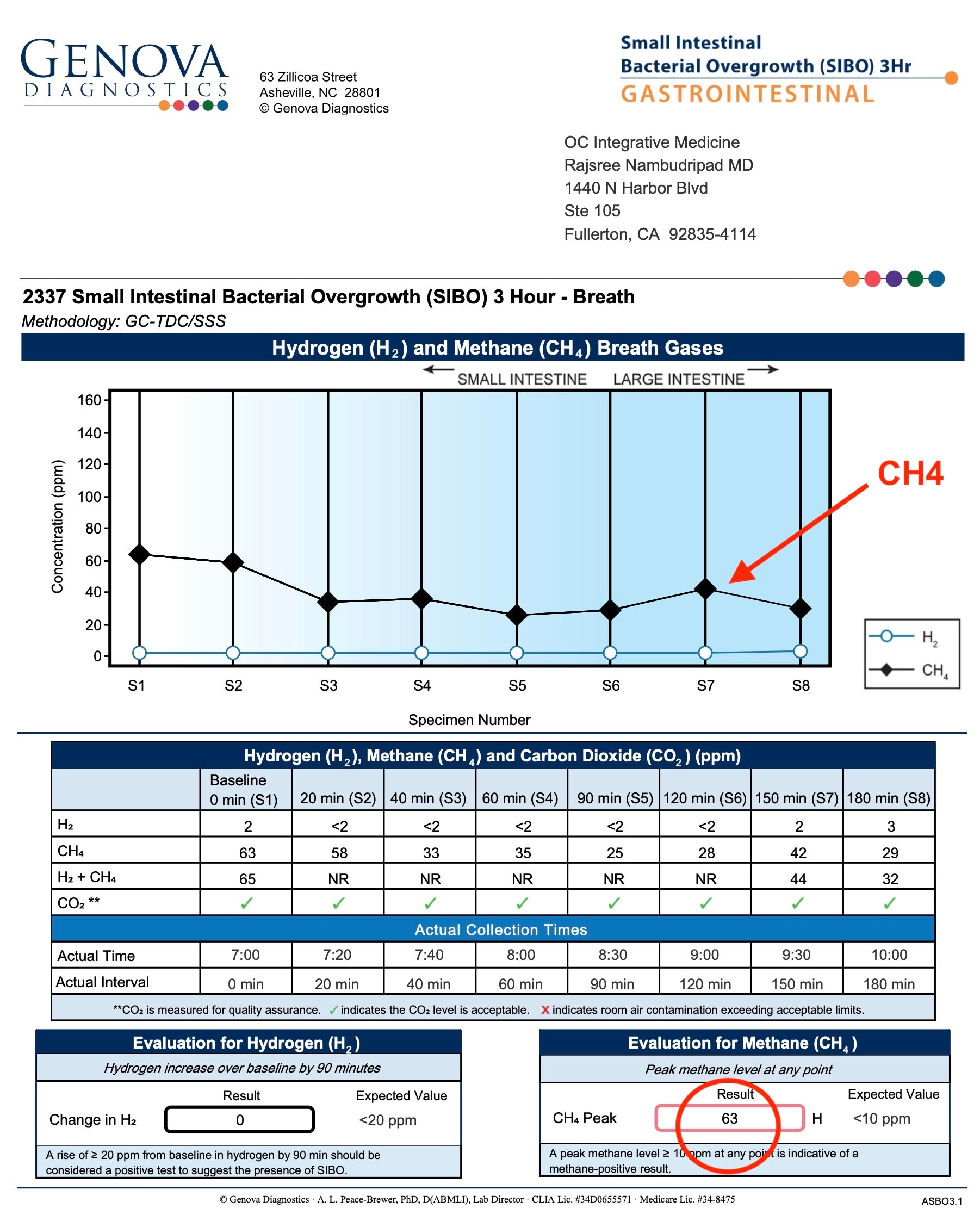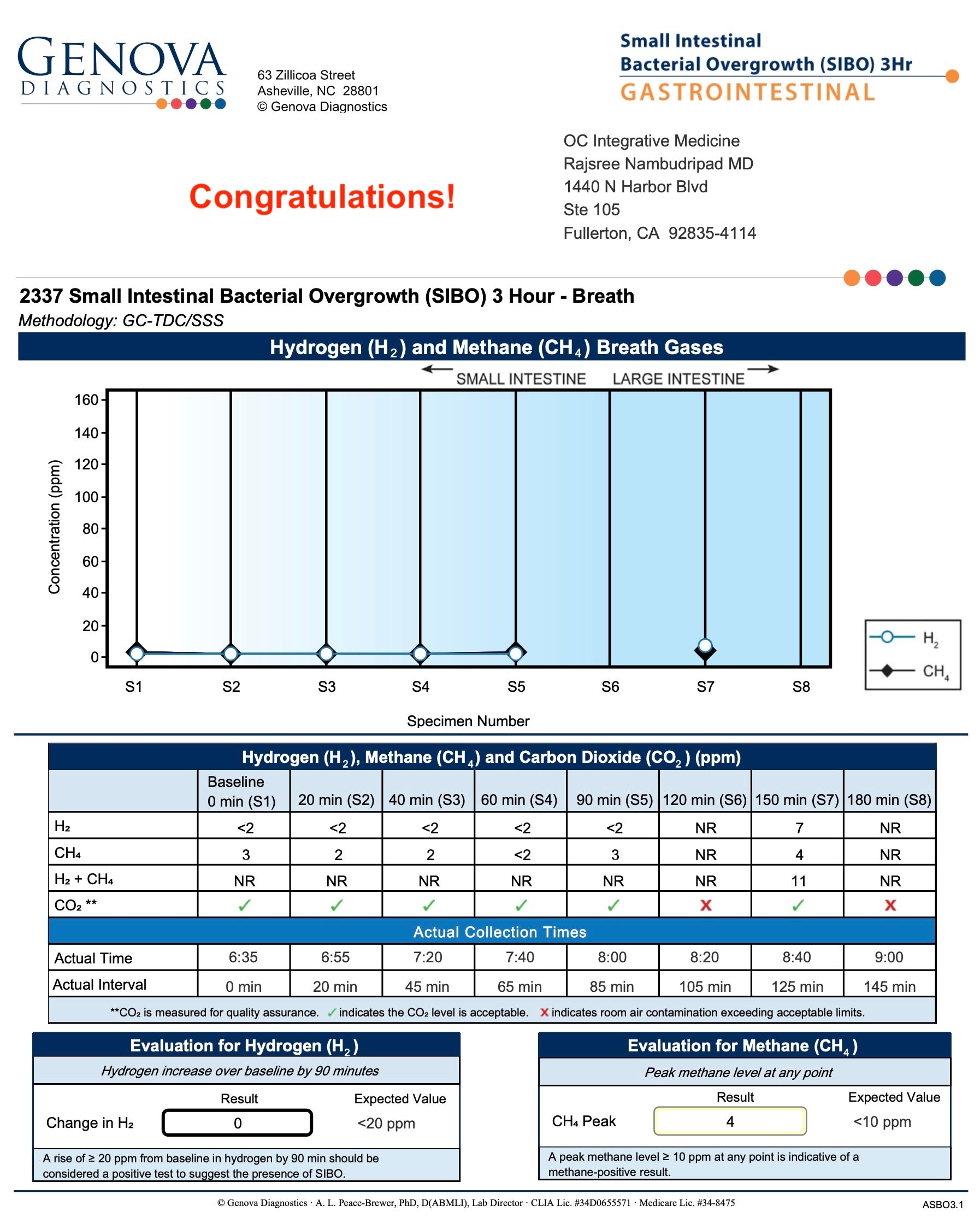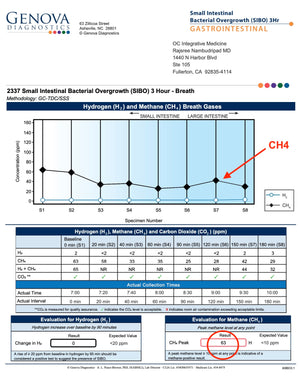Patient Background
This is the case of a 37-year-old woman with a known history of Hashimoto’s thyroiditis who presented with persistent bloating and abdominal distension, despite having regular bowel movements with the support of magnesium. She suffered from heavy periods and was found to have multiple fibroids on pelvic ultrasound.
She was following a strict gluten-free, dairy-free, soy-free, egg-free diet due to sensitivities in the setting of Hashimoto’s thyroid disease. She had also eliminated almonds based on a mild class 1 allergy on her IgE food allergy panel.
On physical examination, her abdomen was moderately distended and had mild diffuse tenderness to palpation.
Recent laboratory evaluation revealed:
- TPO antibodies elevated at 280 IU/mL (previously lower)
- Vitamin D now optimized at 60 ng/mL
- Normal TSH and Free T4, not requiring thyroid medication
To dig deeper regarding root causes of a rise in her TPO Ab level, stool microbiome testing was pursued.
Stool Microbiome Testing
Comprehensive stool testing using the GI Effects stool profile revealed a marked elevation in beta-glucuronidase at 9,000 U/g — well above the optimal reference range. She had no inflammation or leaky gut.
Elevated beta-glucuronidase is a microbial enzyme produced by certain gut bacteria that can disrupt detoxification and hormone metabolism, increasing the risk of:
- Estrogen dominance
- Recirculation of toxins
- Hormone-driven conditions such as fibroids, which she had!
Given this result and the ongoing bloating, we pursued SIBO breath testing.
SIBO Breath Testing
Her lactulose breath test showed:
- Methane (CH₄): 63 ppm — diagnostic for severe Intestinal Methanogen Overgrowth (IMO)
- Hydrogen (H₂): 0 ppm
This methane-dominant result further supported the presence of dysbiosis as a root contributor to both her bloating and elevated beta-glucuronidase.

Treatment: Implementing Dr. Rajsree’s SIBO Protocol
We initiated a Dr. Rajsree’s 4-Phase Herbal SIBO Protocol, tailored to target methane producing archaea and rebalance the microbiome.
Phase 1-2: Promote Motility and Reduce Gas Levels
- Essential Magnesium 2-4 capsules (bedtime) adjust to bowel habits
- Motility Activator 1 capsule (bedtime)
- Digestive Enzyme Pro (1-2 capsule before or after meals)
Dietary Strategy:
She began a low FODMAP / low lectin SIBO diet, with specific instructions to practice meal spacing:
- Avoid snacking between meals
- Maintain 4–5 hours between meals
- Maintain a 12-hour overnight fast between dinner and breakfast
Phase 3-4: Reduce Inflammation and Targeted Herbal Antimicrobials
In the next phases of the protocol, we introduced Spore Probiotics and targeted herbal antimicrobials to address bacterial and methanogen overgrowth:
Addition of:
- Spore Probiotic IgG (3 capsules in the morning on an empty stomach)
- Berberine Pro, Oregano Oil, and Allicidin (1 capsule of each after every meal for 6 weeks)
Outcomes
Repeat Lactulose Breath Test at the end of the 6 weeks revealed:
- Methane (CH₄): decreased from 64 ppm →4 ppm (normalized)
- Hydrogen (H₂): 0 ppm

Clinically she reported:
- Resolution of abdominal distension and bloating
- Improved energy and clearer thinking
- Improved digestion and less post-meal fullness
Follow-up labs revealed:
- TPO antibodies decreased from 280 → 182 IU/mL
One year later, repeat stool testing showed:
- Beta-glucuronidase reduced from 9,000 → 2,300 U/g, now within the normal range
Maintenance Plan
To help maintain her progress:
- Transitioned to Probiotic 100 Billion for microbiome support
- Continued Essential Magnesium and Motility Activator at bedtime
- Continued Digestive Enzyme Pro with meals.
- She remained on a gluten-free, dairy-free, soy-free diet for Hashimoto’s thyroid disease, but was able to reintroduce other fruits and vegetables back into her diet.
Key Insights
This case highlights how Intestinal Methanogen Overgrowth (IMO) can:
- Drive elevated beta-glucuronidase, which impairs detoxification and estrogen clearance, and may be a root cause of fibroid development.
- Contribute to systemic inflammation and may exacerbate autoimmune activity in Hashimoto’s thyroiditis.
By treating SIBO and restoring microbial balance through Dr. Rajsree’s 4-Phase Protocol, this patient experienced:
- Symptomatic relief with resolution of bloating and normalization of bowels habits.
- Objective improvement in autoimmune markers (TPO antibodies)
- Her follow up GI Effects stool profile showed normalization of beta glucuronidase, which shows that clearing dysbiosis caused by SIBO can normalize this key enzyme in the gut microbiome.
This case exemplifies how treating SIBO can reduce symptoms of bloating, improve thyroid autoimmunity in Hashimoto’s, and improve hormone balance by normalizing the beta glucuronidase enzyme.





